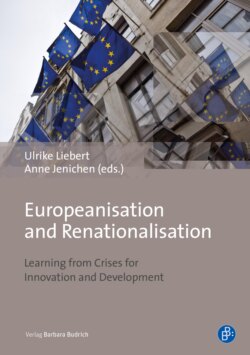Читать книгу Europeanisation and Renationalisation - Группа авторов - Страница 32
На сайте Литреса книга снята с продажи.
8. Renationalisation or Europeanisation? The Czech Republic after the crises
ОглавлениеThe economic crisis has left clear marks on the CR. While in 2017 it is a prospering country, with very low unemployment and strong economic growth, some changes that the crisis brought have revealed themselves to be more permanent. Among these was the significant fall in support for parties which we would describe in the entire 20-year post-Velvet-Revolution era (1989-2009) as “traditional” (ODS in particular, but also ČSSD). Parties with a completely different style of doing politics than the established parties were familiar with anchored themselves in the party system. The transformation of the style of “how to do politics” to a large extent coincided with the aforementioned growth of the protest character of parties and also with the general growth in populism. The drop in support of “traditional” parties, however, cannot be explained through the Europeanisation of patterns of party competition. Even after 2010, the presence of the topic of "Europe" in partisan competition remained barely noticeable and generally very low. If any instability shook the Czech party system, it was at most an indirect effect of the crisis. The changes in the Czech party system were therefore not primarily initiated by an economic shock, but rather by an ill-advised response on the part of the government party, the ODS, which pushed through increased taxation of the rich. In terms of its financial effect, the latter was largely symbolic and failed to bring much into the state coffers, but it was seen by the party’s electorate as a betrayal of its programme.
The economic crisis left marks not only on the party system. The long-discussed adoption of the Euro has been put off indefinitely. All efforts of parties to discuss an adoption date have evaporated, first for the reason that ANO, a key government party, is disinclined to adopt the common currency, and also because the public is against it (both reasons are likely interrelated). In society overall, Eurosceptic stances have proliferated, which is demonstrated by statistics concerning citizen support for the European Union and Czech EU membership.
From a long-term perspective, it appears that Europeanisation is a very volatile phenomenon and fails to show any clear trends. From the perspective of the salience of European issues in party platforms, we see a relatively low [62] degree of Europeanisation, as debate on the content of individual policies often collapses into mentioning EU financial advantages, which for the country means receiving money from the EU structural funds. The exceptions to this have only been the running discussion (or public hysteria) regarding the ratification of the Lisbon Treaty and currently the migration crisis. Creeping renationalisation, which is offered as a name for the phenomena occurring in the CR during the crisis, may be a possible expression to describe current politics as well, though it is too early to evaluate it with equal confidence. As the chapter shows, since around 2014, a slight but definite correction of trends caused by the crisis (dissatisfaction with the Union, number of opponents of euro adoption) has occurred. It is therefore an open question of how Czechs' relationship with the EU will unfold in the following years in light of the unforeseeable development of the migration crisis.
